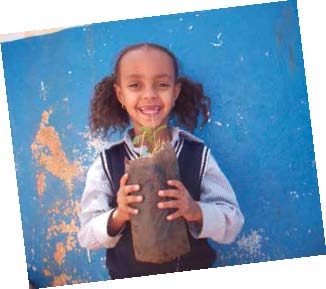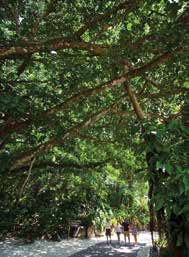Speaking for THE TREES

ALONG WITH SELECTING REWARDS WITH THEIR CONSERVATION CREDITS, ALL PARTICIPANTS RECEIVED RAIN PONCHOS WITH THE LOGO OF THE LOCAL NATURE RESERVE THEY’RE HELPING. PHOTO COURTESY OF MFG
Tim L. Tetzlaff
Naples Zoo Director of Conservation
Recently, Naples Zoo reached a milestone of funding the planting of over half a million trees in Africa, Asia, and the Americas.
Thinking about trees, I recalled reading my daughter The Lorax years ago and reflecting on how some of the simplest lessons can
be the hardest to put into practice. Dr. Seuss illustrated the connectedness of trees and wildlife and our dependence on the natural order. He also left us with the challenge to care. Below are a few examples of some of the steadfast people associated with Naples Zoo who are doing the hard work of putting those lessons into practice – and speaking for the trees.
PLANTING CHANGE
Let’s start with those half million trees. In 2009, Naples Zoo began funding Trees for the Future, a nonprofit begun by Dave and Grace Deppner after their experiences planting trees to reverse the impact of illegal logging and unsustainable land management while volunteering in the Philippines. While Dave passed away in 2011, these coordinated and monitored tree projects continue to expand enabling communities to restore their environment, grow more food, and build a sustainable future from what was once wasteland – good news for both people and wildlife.

A “LIVING WALL” NEAR A MAASAI HOME.
PHOTO BY DIEDRE LEOWINATA/AFRICAN PEOPLE & WILDLIFE FUND.
CARING FOR THE AGED AND LOST
With a botanical garden dating back to 1919, many of Naples Zoo’s aging historic specimens require specialized attention. To give that TLC to the trees, Naples Zoo’s Director of Gardens and Grounds Danielle L. Green brings not only her own experience, but has built an internal team in concert with a network of professional arborists to nurture these giants while also caring for and expanding the other plantings, hundreds of which you can find labeled along the walking paths. Beyond Naples, Danielle serves as
president of the Association of Zoological Horticulture and assists on orchid restoration work in South Florida. Her botanical connections also enabled Naples Zoo to get engaged in funding a collaborative effort headed up by Atlanta Botanical Garden that plans to restore four orchid species that were lost in Florida, but still remain in Cuba.
BIRD LOVERS UNKNOWINGLY HURT BIRDS
 Many birders who lament the loss of bird populations may be unknowingly contributing to that decline. The issue is coffee. The average cup we drink comes from beans grown in the sun on clear-cut farms that once provided forest homes to local wildlife and those traveling birds. The solution is shade grown coffee, but be careful. The marketing language on a bag of coffee can give one impression, while reality can be another. Even some certifications only guarantee 30 percent of the coffee in the bag is actually shade grown. To allow bird lovers and others to truly make a difference, Dr. Robert Rice coby founded the Bird-Friendly® certification overseen by the Smithsonian Migratory Bird Center. Look for this logo to get the industry’s gold standard for shade-grown, organic coffee. We serve this at Naples Zoo and you can buy it in bags at Wynn’s Market. It’s harder to find in K-cups, but consider buying a reusable K-cup filter. You’ll not only enjoy the best coffee, you’ll also save significantly over the $35 to $50 a pound that regular K-cup coffee costs.
Many birders who lament the loss of bird populations may be unknowingly contributing to that decline. The issue is coffee. The average cup we drink comes from beans grown in the sun on clear-cut farms that once provided forest homes to local wildlife and those traveling birds. The solution is shade grown coffee, but be careful. The marketing language on a bag of coffee can give one impression, while reality can be another. Even some certifications only guarantee 30 percent of the coffee in the bag is actually shade grown. To allow bird lovers and others to truly make a difference, Dr. Robert Rice coby founded the Bird-Friendly® certification overseen by the Smithsonian Migratory Bird Center. Look for this logo to get the industry’s gold standard for shade-grown, organic coffee. We serve this at Naples Zoo and you can buy it in bags at Wynn’s Market. It’s harder to find in K-cups, but consider buying a reusable K-cup filter. You’ll not only enjoy the best coffee, you’ll also save significantly over the $35 to $50 a pound that regular K-cup coffee costs.
LAND FOR LEMURS
With Madagascar about 90 percent deforested, efforts to protect remaining forest and restore degraded areas are both exciting and challenging. This past year, Maya Moore, Program Director of the Madagascar Fauna and Flora Group (MFG), and her team
helped take a growing reforestation project to a new level through a conservation credit program that created better monitoring and even stronger involvement by the community. The MFG is also part of a long-term program to grow the seeds of critically endangered species in nurseries and plant them in protected areas to prevent their extinction. After all, without the forests, there would be none of the amazing lemurs, fosas, and chameleons which is just one of the reasons we are a Managing Member of the MFG.
LIONS AND LIVING WALLS
If you take a cutting from an African myrrh tree, dry it, and put it in the ground, it will start growing in the rainy season. Dr. Laly Lichtenfeld and her team with the African People and Wildlife Fund use this Maasai tradition for a new purpose. A ring of these trees combined with chain link form a “Living Wall” around livestock at night that was shown to be 99.9 percent successful over a 10-year study in preventing predator attacks. In turn, this protects lions by eliminating retaliatory killing by angry herders. Owners also don’t need to constantly replace drying thorn branches and wood posts, which benefits the habitat and wildlife by decreasing human pressure on the local trees.

ZOO GUESTS WALK BENEATH THE CANOPY OF
A WEST AFRICAN RUBBER TREE IN THE HISTORIC GARDENS
LIVING LEGACIES
All of these people and organizations as well as the trees they are planting are creating a legacy. There’s an old saying that says the best time to plant a tree is twenty years ago. And the next best time is now. I hope you’ll take time to appreciate the legacies left to us by others and start or expand on one of your own today.
Far from the simple menageries of past, today’s nationally accredited zoos are centers of learning and natural crossroads for biologists, educators, environmental scientists, and researchers – as well as for students, conservationists, and all animal lovers. Naples Zoo at Caribbean Gardens is a trusted, private 501(c)(3) nonprofit serving wildlife and families here and around the world. More information at www.napleszoo.org.



Leave a Reply
Want to join the discussion?Feel free to contribute!